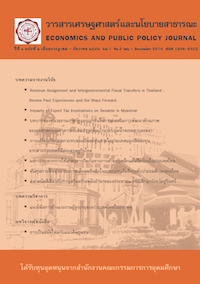ผลกระทบจากการใช้มาตรการกีดกันทางการค้าของเหล็กแผ่นรีดร้อนในประเทศไทย
Main Article Content
บทคัดย่อ
การศึกษาในครั้งนี้มีวัตถุประสงค์เพื่อประเมินผลกระทบจากการใช้มาตรการกีดกันทางการค้าของเหล็กแผ่นรีดร้อนที่มีต่ออุตสาหกรรมเหล็กแผ่นรีดร้อนและอุตสาหกรรมต่อเนื่องซึ่งประกอบไปด้วยอุตสาหกรรมเหล็กแผ่นรีดเย็น อุตสาหกรรมท่อเหล็ก และอุตสาหกรรมรถยนต์ โดยการวิเคราะห์ ดุลยภาพบางส่วนจากแบบจำลองระบบสมการเกี่ยวเนื่อง (Simultaneous Equation) แล้วทำการประมาณค่าสัมประสิทธิ์ของสมการด้วยวิธีกำลังสองน้อยที่สุดสามชั้น (Three Stage Least Squares : 3SLS) ซึ่งได้ใช้ข้อมูลตั้งแต่ปี 2545 - 2552 ผลการศึกษาพบว่า นโยบายการกีดกันทางการค้าของเหล็กแผ่น รีดร้อนส่งผลให้ราคาเหล็กแผ่นรีดร้อนภายในประเทศสูงขึ้นอย่างมีนัยสำคัญ ส่งผลให้อุตสาหกรรม ท่อเหล็กจะได้รับผลกระทบจากมาตรการดังกล่าวมากที่สุดประมาณร้อยละ 38.07 ของมูลค่าสวัสดิการรวมทั้งหมด รองลงมาคืออุตสาหกรรมรถยนต์และอุตสาหกรรมเหล็กแผ่นรีดเย็นร้อยละ 31.13 และ 18.16 ตามลำดับ อย่างไรก็ตามการศึกษาดังกล่าวสนับสนุนให้ผู้ผลิตเหล็กแผ่นรีดร้อนขยายกำลังการผลิตให้มากขึ้น หรือสร้างโรงงานเพิ่มภายใต้การดำเนินนโยบายการตอบโต้การทุ่มตลาดที่ขยายระยะเวลาออกไปเพื่อเพิ่มศักยภาพในการผลิตและรองรับความต้องของเหล็กแผ่นรีดร้อนที่จะเพิ่มสูงขึ้นในอนาคต
Impacts of Trade Barriers Thailand’s Hot-Rolled Steel Market
The objective of this study was to evaluate the impact of trade barriers in hot-rolled steel on the hot-rolled steel industries and the related industries including cold-rolled steel, metal tube and automotive industries. This analysis is based on the concept of partial equilibrium. The process of this analysis started from building a simultaneous equation model and then, estimating the equations using three-stage least squares method. The study employs secondary data from 1st quarter of 2002 up to the 4th quarter of 2009. The results of this study showed that trade restrictions in hot-rolled steel will raise domestic price significantly that cause the metal tube industries suffer most from the impact of trade barrier by social welfare decreasing about 38.07 percent. As social welfare of the automotive industries and the cold-rolled steel industries have dropped by about 31.13 percent and 18.16 percent, respectively. However, this study encourages the capacity expansion of hot-rolled steel industries under the situation of antidumping actions in order to increase production potential and support an increasing demand of Hot-rolled steel in the future.
Article Details
สงวนลิขสิทธิ์ © 2553 คณะเศรษฐศาสตร์ มหาวิทยาลัยศรีนครินทรวิโรฒ
คณะเศรษฐศาสตร์ มหาวิทยาลัยศรีนครินทรวิโรฒ จัดพิมพ์วารสารเศรษฐศาสตร์และนโยบายสาธารณะ เพื่อเผยแพร่บทความวิชาการทางเศรษฐศาสตร์ นโยบายสารธารณะ และสาขาอื่นๆที่เกี่ยวข้อง ทัศนะและข้อคิดเห็นใดๆ ที่ปรากฏในวารสารเป็นความคิดเห็นส่วนตัวของผู้เขียน โดยบทความที่ได้รับการตอบรับจะถือเป็นลิขสิทธิ์ของคณะเศรษฐศาสตร์ มหาวิทยาลัยศรีนครินทรวิโรฒ
บรรณาธิการ อาจารย์ ดร.พลพัธน์ โคตรจรัส


